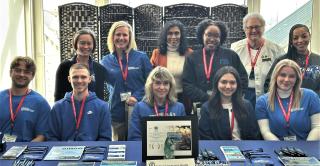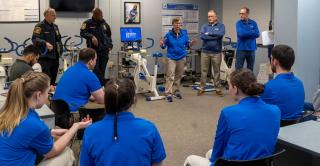
Her colleagues will say that Maria Alvarez loved three things: students, her work in Central's Registrar’s office, and volunteering at her local food pantry. Alvarez, who worked for the university for 32 years, died just before Christmas in 2015, but her legacy of love carries on at the new food pantry named after her.
Located at the Catholic Campus Ministry’s Newman House, the Maria A. Alvarez Food Pantry is a collaboration of the Office of Community Engagement, Central's Campus of Compassion, and Catholic Campus Ministry and serves Central's students, faculty, and staff in need. Volunteers keep all visitor information confidential.
That food insecurity exists on college campuses surprised many members of the pantry’s organizing committee. Pantry coordinators Rebecca Pickering and Nancy Boscarino recall attending the Office of the Provost’s open meeting in August 2015 where it was revealed that 21 Central students were homeless.
Their amazement quickly turned to action, and Pickering and Boscarino started talking with their colleagues about what they could do to help.
“We saw a need and we just couldn’t ignore it,” says Pickering, an assistant registrar.
Soon enough, Central staff members from several departments had formed a committee tasked with addressing the needs of homeless and food-insecure students.
Boscarino notes, “The question came up: Now that we are a campus of compassion, what can we do to be more compassionate?”
Feedback from the university community sparked the idea for an on-campus food pantry.
“When we started this, we would hear stories from faculty members; (one told us) ‘I had a graduate student who lived out of their car while going to school.’ We thought if at least they had some food to eat, we could alleviate some of that difficulty.”
Many factors contribute to food insecurity. The College and University Food Bank Alliance (CUFBA), an organization focused on alleviating food insecurity, hunger, and poverty among college students in the U.S., points to changing demographics among college students.
CUFBA’s website notes, “Postsecondary enrollment patterns show that more and more college students do not fit the perception of the typical college student. … What has long been termed the ‘non-traditional’ student is fast becoming the average college student. Many students are now supporting families and working full-time while attending college.”
To best determine if a food pantry would make a useful impact at Central, the committee conducted an anonymous, voluntary survey of students, using guidelines from CUFBA. More than 400 responses that came back to the committee revealed strong support for a food pantry. Bolstered by that feedback, the committee sought advice from staff at Norwalk Community College, the only college campus food pantry in operation at the time, and from committee member and University Assistant Michelle Nickerson, who helped to open a food pantry at Manchester Community College as part of her graduate work.
Members researched a variety of places in which to base the food pantry, but when John Campbell of Campus Ministry offered the finished basement at the Newman House, they quickly took him up on the offer. The house’s location slightly off-campus and a rear entrance into the pantry provide some layers of privacy to visitors; plus, the basement sports sturdy, wooden built-in wall shelves, ideal for storage and display of non-perishables available to visitors.
With a few starter donations from the Archdiocese of Hartford and the Bursar’s Office and an abundance of nonperishables collected during Competition for a Cause, the pantry opened on Feb. 16.
And despite its short time on campus, the pantry has seen some business, thanks in part to the efforts of volunteers like Joni Moody, a social work intern for the Office of Community Engagement. Moody will graduate in May with a degree in social work and continue her studies toward a master’s in social work at University of North Carolina – Chapel Hill this fall.
Moody has worked on the food pantry initiative from start to finish as her senior internship project. Along with all the logistical work in staffing the pantry with volunteers and preparing it for visitors, Moody has been spreading the word about the pantry around campus. Her intention is to warmly welcome potential visitors and to deconstruct the stigma of food insecurity.
“We want it to be inclusive to everybody, no matter what your financial standing is or who you are on campus; everyone can use it as a resource,” Moody explains. “Everybody has bills —tuition, rent — so we’re trying to encourage people to save that $20 on food and maybe use it toward your rent or textbooks,” she says.
Furthermore, she notes, everyone’s got to eat.
“As we’ve been advertising (the pantry) and talking to different groups on campus, we’ve been trying to address the holistic well-being of the student. To be driven and academically focused and mentally prepared for the day, you also have to be physically well and taking care of your body. And food, of course, is a big part of that.”



